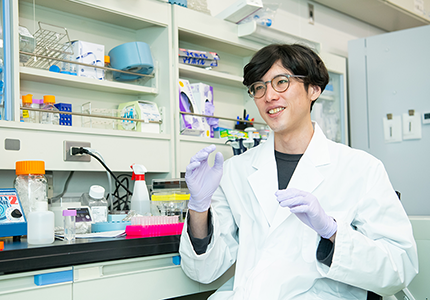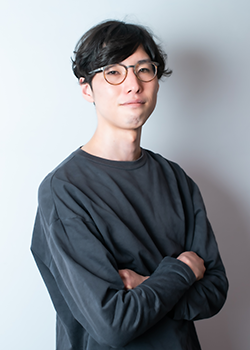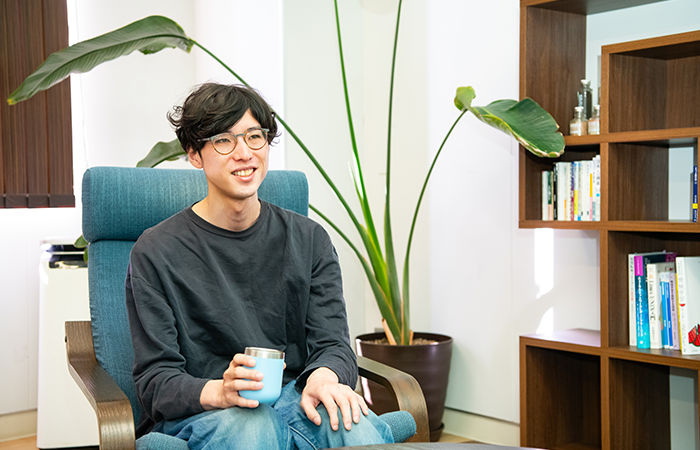Maximizing the Use of Bioresources and Paving the Way for Basic Research Applications
BRC is supported by a diverse staff who are involved in a variety of tasks. We have interviewed staff members from each of the 12 laboratories that make up BRC, asking them about their activities and their day-to-day efforts in their research rooms.
This time, we are speaking with Nao Okuma, who is a Special Postdoctoral Researcher on the Plant-Microbe Symbiosis Research and Development Team.
We asked Okuma, a young researcher who is working on research and development that is expected to lead to industrial applications while utilizing RIKEN BRC’s bioresources under the Special Postdoctoral Researcher program, about his approach to research and his future goals.
Research is the search for new possibilities
Experimentation is the search for results that exceed one’s expectations
Actually, it was not so long ago that I chose to follow a research career. Through a process of trial and error, I entered the Faculty of Agriculture at university. After that, I went into the Master’s Program as everyone around me was going there, but by the time I finished the program, I had begun to think vaguely that research might be interesting. After that, I got a job, but I realized that I was better suited to becoming a researcher than to working at a general business company, so I changed my direction and returned to the research field.
What I find interesting about doing research is that I can come up with my own themes and goals and proceed at my own discretion. I like to think for myself, and having well-defined goals helps me to persevere even in situations where it is difficult to see what lies ahead. When conducting experiments and collecting data, I think everyone has their own way of proceeding. But once I have begun an experiment, I try to write down a plausible path to reaching the result myself. This is also the highlight of the research. Once I have written down a hypothesis of what I think will happen and what I think the conclusion will be, I continue experiment through a process of trial and error.
As an experiment proceeds, it is very likely that the initial hypothesis will turn out to differ from the actual results. Of course, just because the hypothesis doesn’t work out doesn’t mean that it’s wrong, so we proceed with the research, reconstructing a hypothesis that is consistent with the results obtained, until we eventually reach a reproducible goal. Even if the hypothesis runs contrary to our expectations, I hope that the accumulation of such research results will be a small step forward in the world of science, and that it will be valuable in its own way.
Research is a process of exploring possibilities and using your imagination to reveal what is currently unknown, and perhaps that is where the fun and joy lies. This was the moment when I realized that research must search for results that go beyond my expectations.

Research using bioresources that only RIKEN BRC can provide
Soils in which plants grow are the richest microbial environments on the planet, and contain microorganisms such as mycorrhizal fungi that live in symbiosis with plants. Advances in our understanding of the symbiotic relationship between plants and microbes are expected to contribute to a sustainable food supply and to reducing the environmental burden on a global scale. RIKEN BRC handles five major bioresources, which make it possible to conduct research that combines different types of bioresources.
The Plant-Microbe Symbiosis Research and Development Team, to which I belong, is engaged in research and development that will lead to the elucidation of the actual conditions of agricultural ecosystems and their industrial applications.
I am currently conducting research in this division on how plants adapt to environmental changes in agricultural fields. We measure and analyze environmental conditions such as the nutritional status of soil and the abundance of microbes, the condition of the plants, and various other related factors in the natural environment.
Plants have been the main focus of my research since my student days, and since that time I have also been interested in agriculture, so I began to study the environmental adaptation strategies of plants in relation to agriculture. I have also been working for some time on analyzing soil as an element that stimulates and influences plants. During my doctoral course, I studied the adaptation strategies of plants to their environment by genetically modifying plants, but this research was limited to the laboratory, and was not sufficient to explain how plants grow in agricultural settings.
Although I wanted to conduct more comprehensive rather than partial research, it was difficult to find an environment in which I could do such extensive research. I had half given up, but when I learned that the division where I am working now was doing something similar, I applied for the Special Postdoctoral Researcher program at RIKEN, and here I am today.
My research is research that uses bioresources, and I think that the reason why I was employed as a Special Postdoctoral Researcher was because my employers recognized my strong belief in RIKEN BRC as the only place where I could engage in this kind of work. Beyond the framework of my own laboratory, the Experimental Plant Division and the Microbe Division have supported me by providing plant seeds and bacteria, and by carrying out genetic modification.
Aiming to move beyond basic research and toward practical applications
The first thing I was taught in graduate school was to be skeptical. To put it in more extreme terms, I was taught to read research papers as if they were half-truths. When you are not used to reading papers, you tend to read them as if you were reading a textbook. However, I was told to stop doing that, and I learned that no matter who wrote the paper or what it was about, it was important to approach it with the attitude of "Is this true?"

Certainly, if you read more than a certain number of papers, you discover a lot of things, and it is not uncommon for the data to seem plausible at first glance. In many cases, however, the data is not sufficient to support the paper’s conclusions.
What I value most in writing a paper is to try to present the key aspects of the research, as carefully and precisely as possible so that everyone can understand it. I believe that the most important thing in research is the output, so I like to work calmly and patiently to produce papers that everyone can understand, while also applying the skepticism necessary for a researcher to myself.
What I would like to achieve in the future is to apply our basic research not only in the laboratory but also in fields that bring practical benefits, such as agriculture. Currently, with a view toward practical applications, I am working every day on research to create resources of bacteria that are useful for crop production and also to realize the digitalization of agriculture.
Profile
- Nao Okuma
- Special Postdoctoral Researcher,Plant-Microbe Symbiosis Research and Development Team
- Joined RIKEN BRC in 2022 Since his student days, his main research theme has been environmental adaptation strategies of plants related to agriculture. As a Special Postdoctoral Researcher, he is currently working on the integrated analysis of large-scale data on plants, soil, and microorganisms obtained from the agricultural field, and on the proof-of-concept of the findings obtained through molecular biology experiments.
Release date : June 19, 2024
